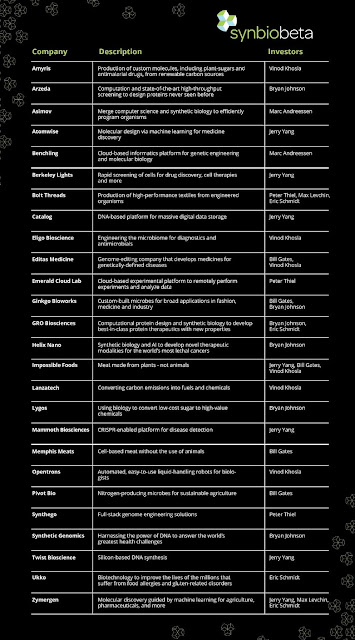If the 20th century was the era of computers, the 21st century may be the era of biology. And the two may even merge. Hello, synthetic biology and biological computing!
Last week SynBioBeta hosted The Global Synthetic Biology Summit, "where tech meets bio and bio meets tech." People were urged to attend "to see how synthetic biology is disrupting consumer products, food, agriculture, medicine, chemicals, materials, and more."
Chrissy Farr of CNBC reported:
“The conference has an irreverent, counter culture vibe to it,” said Jorge Conde, an investor at Andreessen Horowitz, who spoke at the event. Conde said that the founders are a “new breed” and they reminded him of the first generation of Silicon Valley entrepreneurs in the era of Steve Jobs.Indeed, the field is attracting tech insiders. Former Google CEO Eric Schmidt spoke at the conference, and was practically giddy about the prospects:
I’m always interested in the question: What is changing the fastest right now? Because whatever that is determining the history of next year. There’s lot of evidence that biology is in that golden period right now.”He also added: "Biology will undoubtedly fuel computing. Taking biology, which I’d always viewed as squishy and analog, and turning it into something that can be digitally manipulated, is an enormous accelerator."
It's not just talk. Take a look at this list of synthetic biology companies and their funders:
SynBioBeta boasts: "The industry has raised more than $12.3B in the last 10 years and last year, 98 synthetic biology companies collectively raised $3.8 billion, compared to just under $400 million total invested less than a decade ago." It counts 628 new synthetic biology companies formed in 2018 alone.
As a sure sign that the field has hit, or expects to soon hit, the mainstream, StatNews reports that synthetic biology now has a new lobbying group (and a new magazine).
I've written before about biohackers and gene editing, how we're using DNA to create "lifelike" mechanisms, how DNA may prove to be the ultimate storage medium, even how DNA may prove to be a computing platform. They, and many other avenues, are all exciting, but I'm probably most interested in the latter two. Can biology power our computing?
In 1995 (!), Bill Gates famously wrote: "DNA is like a computer program but far, far more advanced than any software ever created." As Microsoft researcher Karin Strauss put it more recently: "Think of compressing all the information on the accessible Internet into a shoebox. With DNA data storage, that’s possible."
Jayshree Pandya writes in Forbes:
While silicon microprocessors have so far been at the heart of the computing world, they are reaching their physical limit. With on-going challenges of physical speed, energy efficiency, and miniaturization limitations of silicon microprocessors, there is a need to find alternatives. DNA is emerging as the alternative and has the potential to take computing to new levels. Moreover, with the cheap supply of DNA and the evolving DNA manufacturing processes, the process to develop DNA chip is becoming much cleaner and realistic. DNA-based computers will not only make computers smaller, but they will hold more data as well. The DNA microprocessors are transformative.
We're trying to learn from our biology. Shelly Fan reported for Singularity Hub on an effort by Penn State researchers to develop a "probabilistic neural network" (PNN) that acts more like neurons and synapses. The team pointed out that the brain deploys "billions of information processing units, neurons, which are connected via trillions of synapses in order to accomplish massively parallel, synchronous, coherent, and concurrent computation." They sought to replicate that with their PNNs.
They think they succeeded, at least as proof of concept. As a result, they concluded:
Combined, these new developments can facilitate exascale computing and ultimately benefit scientific discovery, national security, energy security, economic security, infrastructure development, and advanced healthcare programs.Microsoft has a research team focused on biological computation, "developing theory, methods and software for understanding and programming information processing in biological systems." The head of the group, Dr. Andrew Phillips, explained how biological computing is different:
So, it’s more like a chemical soup where you have thousands of proteins interacting in parallel in a noisy fashion, and many of these interactions can go wrong with some probability. But yet out of all that noise emerges a fairly robust algorithm that is used to compute things like, when should a cell divide?...So, these algorithms are actually very complicated for us to understand because we’re not used to that. We’re still trying to reverse engineer them.Dr. Phillips believes "that programming biology is going to transform many of the industries that are in existence today. I think it’s a sort of an underpinning technology that will help transform medicine, food, energy, and build the foundations for a future bio economy that’s based on sustainable technology."
Hold on to your hats.
There has been much speculation about nanobots swimming around in our body correcting problems, implantable computer chips, and brain-computer interfaces, such as Elon Musk is working on at Neuralink. Some of these are already coming to fruition. We're controlling paralyzed limbs, operating computers, even networking brains.
All that's very exciting, for sure. Still, I think it's a very 20th century notion to implant foreign objects into our bodies. We've had some good results with doing that, and we're going to have even more options, but it still seems like only an interim approach.
Reprogramming our cells, storing data in DNA, turning ourselves into even more powerful computers -- that's 21st century technology, and that will be 22nd century health care.



No comments:
Post a Comment